Condo price volatility causes whiplash. But the single-family house price surge is just crazy.
Get this: The median price of a single family house in San Francisco in March soared by 25% year-over-year, or by $337,500, to $1,687,500. But that’s down a notch from February, both in magnitude and nuttiness, when the price had skyrocketed 31% year-over-year, or by $410,000, to the record of $1.7 million flat.
Over the six years since March 2012, the median house price has ballooned by 143%:
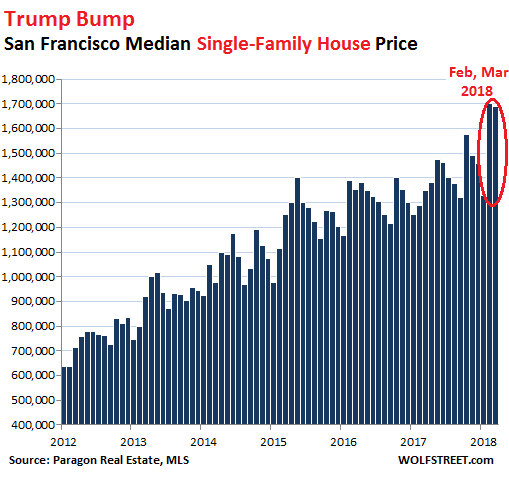
Condos – a category we lump together with TICs (tenancy in common, a specialty in San Francisco), co-ops, and lofts – had been about flat-lining since early 2015, despite major ups and downs in between. The construction boom is putting a lot of new units on the market, though most of them are high end. So in February the median price dropped 7% year-over-year, or by $80,500, to $1,104,500.
But in March, all heck re-broke loose, and the median price surged 10% year-over-year, or by $114,750, to a new record of $1.25 million:
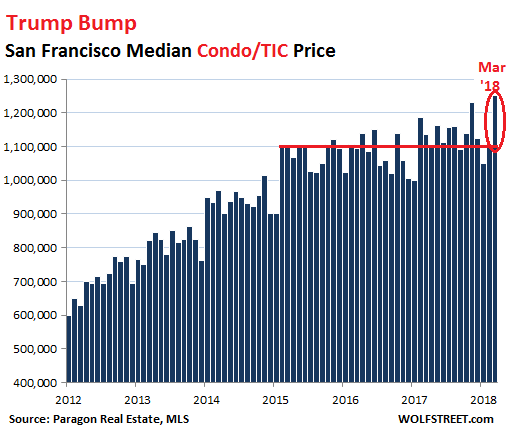
“Virtually every market segment in the city is currently experiencing a feverish high-demand, very-low-supply dynamic,” said Patrick Carlisle, Chief Market Analyst at Paragon Real Estate Group, who provided the data. In his report on the San Francisco market, he added:
Fear of possible impending interest rate increases may be playing a role in demand, but consumer confidence has also been soaring over the past year. Recent financial market volatility, so far, appears to be having little effect on local real estate markets, but it still early to measure this.
Median price means half of the homes were sold at prices above it, and half at prices below it. March data reflects closings in March. This measure is very different from the Case-Shiller Home Price Index for San Francisco, which tracks price movements not only in San Francisco but in a five-county area; it’s based on comparing sales pairs of the same dwelling, and uses a rolling three-month average that is published with a one-month delay. So it will be several months before the first signs of the March spike in median prices show up in the Case-Shiller index.
San Francisco is becoming a city of multi-family buildings. Over the past decades, nearly all the new units coming on the market were condos and rental apartments. Practically no single-family houses have been built recently. Hence condo sales represent the majority of the market. In total, 275 condos were sold in March, compared to 183 single-family houses. In other words, it doesn’t take a lot of sales at the high end to move the price needle.
The next two charts below are on the same scale. The first chart depicts the year-over-year change in the median price of condos. The second chart depicts the year-over-year change in the median price of single-family houses. Note the difference in the vertical bars – and in the condo chart, note the 10 red bars since 2015, denoting year-over-year price declines:
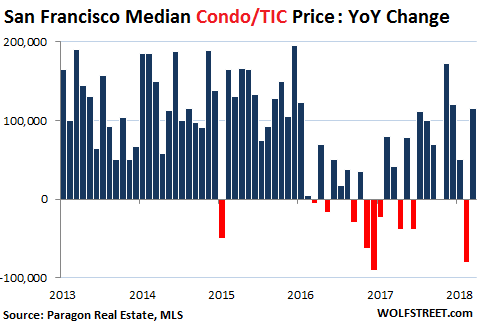
Condo price volatility can give you whiplash, for sure. But the year-over-year house price surges are just plain nuts:
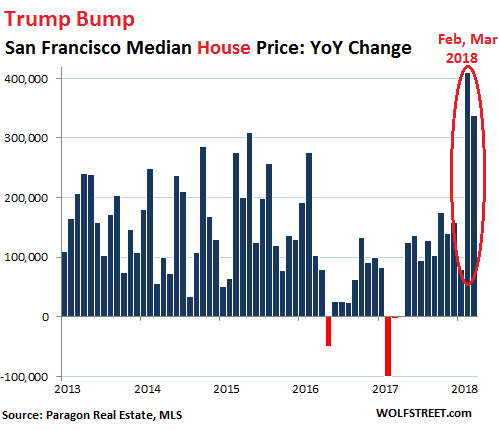
Put together, the median price of all types of dwellings jumped 16% year-over-year, or by $193,500, to $1.41 million:
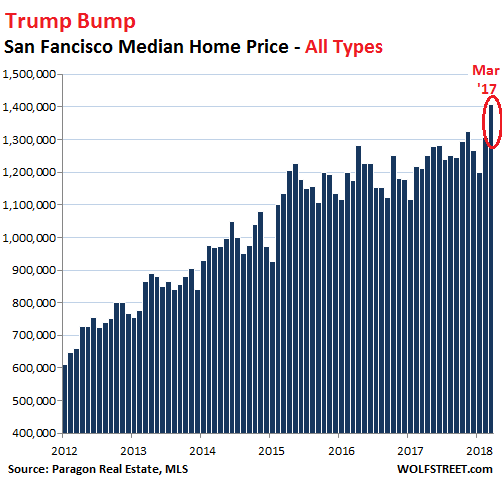
So who gets the credit for this nuttiness? Timing is key. These sales that closed in March weren’t necessarily negotiated in March. Many of them were negotiated sometime between late last year and late January. These were the times of a booming stock market. Over the 14 months from Trump’s election through January 26 this year, the S&P 500 stock index surged over 30%! The markets were particularly exuberant late last year and in January. San Francisco is uniquely dependent on the stock market, and the ebullient mood – the Trump bump – that lasted until January 26 likely added fuel to the housing market. Which is ironic, considering all the talk of how the new tax law was designed to target the expensive markets in California. Those effects might still set in later. But in March, the Trump bump ruled.
Here’s an update on the 100 most expensive rental cities. A story of deep-red and big surges. Read… The Peculiar Phenomenon in the Rental Market Implodes
Enjoy reading WOLF STREET and want to support it? You can donate. I appreciate it immensely. Click on the mug to find out how:
![]()


Crypto wealth effect?
Considering that buying a house can take up to three months because all parties involved but the government want to loophole paying less tax? And the back and forth between what one party wants to pay and another wants to get? Oh and also the paying party having to get the money?
No.
But don’t worry this spike will be soon compensated with a down and by soon I mean this year.
In the Bay Area – and this article is about San Francisco home prices – I’m seeing that it generally takes about 1 month from open house date to close. There is not much haggling among the buyers – the sellers are in the driver’s seat. Buyers are writing offers with zero contingencies, and sellers are even haggling with buyers when one buyer among many offers the highest bid. We’re getting into the “nuttiness” territory.
Agree in these sellers markets nothing takes longer than a month to close except maybe ultra high end properties.
The buyers have to compromise so much just to win a bid…
Due to a death in the family, a small corner home in boundary of Los Gatos (not right in Los Gatos) that probably retailed for less than $35-40,000 when built in the 1970’s just retailed for $1.4M; listed for one day….previewed the week before forone day and interested lookie-loos were told that the bids would be taken the following week. It sold in a flash!
I was born and raised in SF during the Depression. The house we lived in cost approx $5000 to build in the mid 1920’s located in the “Outer Mission”. I have a granddaughter who has a decent job there but shares what used to be two “flats”, two bedrooms each floor that have been split into 4 occupancy spaces, one bdrm each….retail $3900 month each space!!
SF is truly nuts.
Homes/Condos are closing here in the Bay Area in 2 – 4 weeks, not 3 months.
I don’t get it. I don’t even want to work in San Fran, let alone live in it. And there are idiots who pay $1.5 million for old shacks that are so old that they look like from the civil war era.
Maybe hippies, techies, and legalized marijuana don’t mix that well.
Tech can make a young person quite wealthy in pretty short order if they get into a private company with decent stock options that gets bought or goes IPO. The pay is already top notch, but the equity play is the real differentiation to most other careers. Been there, done that. I’ve been out of it since 2005, but I still stay in touch with a few people in their early thirties that are in the thick of it and they’re doing very well.
If you’re in the top circle in a tech company AND have the money handy to buy a bunch of stock at the IPO you *can* make out well.
Otherwise, you’re better off in a unionized trade or something. The footsoldiers in tech make pretty miserable pay and promotions are almost non-existent.
Excellent time to sell, reap appreciation and/or profits, relocate, and get off the treadmill. This requires planning and taking some time to actually think about life going forward.
If people are happy paying 4-5-$6,000 per month house payments for decades, plus property taxes. Great. If not, sitting down a few nights to jot down some ideas with pencil and paper is a great to start living deliberately. Just a free opinion on the nuttiness of it all, and no offence intended to Bay Area residents.
I like the old 5 Ps adage. Poor Planning Precludes Poor Performance. Long commutes and debt servitude doesn’t seem like the best way to go.
regards
Not to be pedantic, but don’t you mean “precedes,” instead of “precludes?”
Auto-correct, when it isn’t turned off, has done weirder things to me :-]
re: “Poor Planning Precludes Poor Performance”
pre·clude
prəˈklo͞od/
verb
verb: preclude; 3rd person present: precludes; past tense: precluded; past participle: precluded; gerund or present participle: precluding
prevent from happening; make impossible.
“the secret nature of his work precluded official recognition”
synonyms: prevent, make it impossible for, rule out, stop, prohibit, debar, bar, hinder, impede, inhibit, exclude
“his difficulties preclude him from leading a normal life”
(of a situation or condition) prevent someone from doing something.
“his difficulties preclude him from leading a normal life”
So, poor planning causes good performance?
I’ve been following the Bay Area real estate market (East Bay area) for the last 2 years because I’m thinking of selling my house in a decent part of Oakland to move across town to North Berkeley/Albany which is generally considered a better part of town. I’m shocked at some of the prices I’m seeing like this 3-bedroom, 1 bath Victorian that is cute but not spectacular:
https://www.redfin.com/CA/Berkeley/1830-Francisco-St-94703/home/1419473
It sold for 1.4 million, and Redfin estimates it’s worth 1.18.
I would be using “Proposition 60” which lets me keep my low property tax basis on the new home. But one limitation is that the new home must be the same price or lower than the old home. It’s scary to do a “move up” in this market when you see jumps of 10% in short periods. And, hence, people stay put in their homes and worsen the inventory shortage.
That house was listed for $950k so it sold for 47% over asking price ! Absolute Insanity
RoseN, when doing your calculations to see if you can pull off this move, don’t forget to research the capitol gains tax that might be due on selling your old home. I failed to get this correct on my recent move from Sunnyvale to Union City and it bit me hard. Best of luck.
We’ve been looking at buying on the peninsula for over a year. In our little town over the past 2-3 months, bids of $1M over asking have become the new norm. We recently toured a teardown listed for $3M (4 bed, 3 bath, 2400 sq ft, original 1950s condition)… and it sold for $4M.
I’m sure it’s largely stock-related, but I’m also wondering if the urgency has something to do with crypto. Peak crazy.
Toronto had this nuttiness a year ago, and we know where they are now. Let’s hope San Fran is following the same pattern.
Two differences between Toronto and SF come to mind, zoning and topography. Having lived in bay area for years, and having been priced out of buying many years ago, it’s interesting to see the frenzy and speculate on what this place will be like when it’s an even wealthier enclave. I remember reading (20 years ago!) about Peninsula gardener types living near their work by sleeping on the bus that runs up and down El Camino Real 24/7. There was a nest of RVers living on the border of Stanfoo campus until removed by the citizenry last year, including the guy who lived there with his family and spent weekends in his inland home.
I lived in Tracy ca back in the 1980’s. Worked in San Mateo. I ended up
Sleeping at work during the week went to the house on the weekend to water the plants. Sold. Left the state as never sorry
Bro has a dump row house in south San Fran. He ought to sell it and rent as he hopes to retire in a couple years. He won’t have to spend a penny on the ramshackle
House
I been wondering if the Stats on housing price increase have taken into account the very low inventory levels relative to just a few years ago. Normally in the Bay Area we have a 5% turnover in most zips nothing close to that today so these price increases reflect a smaller and smaller set of sales vs X years ago. Its important to focus on the small number of transactions at these nose bleed levels and as the number of transactions decline prices magically seem to rise to new extreme levels but when turnover rates return to historical rates the home price appreciation levels will not longer be based on thin sales volume which will be the real test if these home prices are the new norm. I know several home buyers in the 2000 and 2005 era that only recently were able to sell and get out from a terrible buy based of course on the belief that home prices only go up.
This note from Redfin regarding inventory levels as current market demand index declines:
“We’ve started off each of the past three years with inventory down double-digits from the year before, which has held back buyer activity until enough new listings hit the market to get the offers flowing in the Spring.”
From January to February, the seasonally adjusted number of buyers requesting home tours fell by 12.4 percent, while the number of buyers making offers fell 18.0 percent.
Looking at year-over-year comparisons, the Demand Index declined 6.5 percent from February 2017. The number of buyers requesting home tours actually increased 2.9 percent, while the number making offers fell 20.1 percent.
February marked 33 consecutive months of declining home supply across the 15 metros covered by the Demand Index, with 13.6 percent fewer homes for sale than a year earlier. The inventory shortage, paired with strong demand, has driven rapid home-price appreciation.”
That’s the problem. Far too much demand for the current limited inventory. Fewer sales and pushing prices up higher and higher.
It would seem the lendable value should be based on a normal inventory based on some measurable data. If banks see a abnormal low inventory pushing up prices which they know will fall once inventory levels increase they should increase significantly the down payment required for the loan.
Housing bubbles are fueled by easy credit and the faith that there will be a greater fool sometime later.
Rates are low, but “credit is not easy”, at least when it comes to home loans. Mortgage lending standards tightened greatly post 2008, and have not really loosened since. Especially at the Bay Area price point, all buyers need to put a BIG chunk of cash down and have to qualify on their income (producing paystubs and 2 years of tax returns, etc…). And the mortgage lender will check they have cash reserves. So people in the Bay Area that are buying generally can afford it.
This is true I’m a mortgage lender I know typically on jumbo loans you need a minimum 700-720 credit score, at least 10% down sometimes more, debt to income ratio not to exceed 43% and 6 to 12 months Reserves.
What I am beginning to understand is whether the value of the collateral for the loan(home) is valid given the small number of transactions (inventory) that has generated the price for the home. The fact that a buyer is willing to pay the price is only part of the issue since in most cases the the buyer wants a conventional loan but only if the buyer can generate a conventional 10 or 20% downpayment rather then pay cash. If the lender said wait we need a higher downpayment as these market conditions (low inventory) may not last as home values will decline quickly once normal inventory levels return. The lender seems to be taking a much higher level of risk unless they are dumping the loan quickly.
There also fueled by speculators. How many of these houses are lived in? What’s the turnover rate for the house? (Has the same house been sold multiple times in a year) I seen the same thing happen here in Florida during the last bubble. Bubbles burst and somebody is left holding a shack.
Theoretically, housing shouldn’t appreciate unless household population growth exceeds housing starts, or inflation occurs. But since 1960, America’s average annual housing starts exceeded population-based household growth by more than 400,000 — 1.4 million vs. 970,000. Inflation drove most home price gains.
“It’s easier to fool somebody than convince somebody they’ve been fooled”
Mark Twain
Wolf, NO matter how much you howler about the FED and the rest of the central banks are tightening money supply, nobody will pay attention. They will buy houses at what ever prices by making a mental simple prediction based on the trajectory extracted from the past 10 years when FED was “easing”. For some reason, people only draw conclusions from “immediate” past experience and driven by greed and fear.
I am NOT suggesting what will happen for prices of houses. What I am suggesting is that things are changing and at least one should be cautious.
Sometimes, I wonder if other financial websites lift topics and links from this site, and write up their own articles.
This article appeared here, then a few hours later an article almost exactly like this appeared on one of my other favorites financial sites.
Trade War is having its intended effects!!!
So what proportion of these properties were bought by Chinese carrying suitcases full of cash?
This is a different market but I do believe that we will start to see soft spots in certain parts of the country before they are felt elsewhere (i.e. where I am in NC our market hit bottom in the last housing bust – as I recall – a year and half later than hot markets like in AZ, FL, CA). Just sharing this article about Manhattan real estate which is down heavily in sales volume for Q1:
https://www.bloomberg.com/news/articles/2018-04-03/manhattan-home-sales-tumble-most-since-2009-as-buyers-push-back
I am in socal/san diego and we feel this time is really different for san diego. real estate prices would never go down with these ultra slim inventories. a decent home cost close to million dollars with median income in ~ 58K